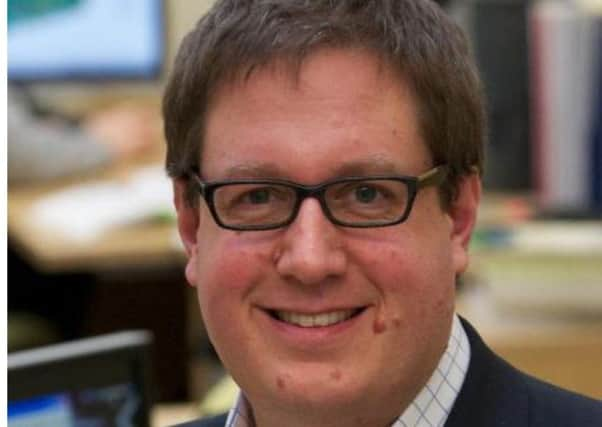Obituary: Prof Jason Reese, internationally renowned engineering scientist and academic


Jason Meredith Reese, who has died suddenly at the early age of 51, was an internationally renowned engineering scientist, respected academic and a valued mentor to many. He made pioneering contributions to understanding the behaviour of gases and liquids at ultra-small length-scales, work which is now underpinning a broad range of key technologies for the 21st century. At the time of his death, he was Regius Professor of Engineering at the University of Edinburgh.
Jason was born in Wimbledon, son of the late historian Dr Trevor Reese and of Hilary Reese (née Charker). He graduated in Physics from Imperial College in 1988 and completed doctoral research on shock waves in rarefied gases at the University of Oxford in 1993.
Advertisement
Hide AdAdvertisement
Hide AdFollowing postdoctoral research in Berlin and Cambridge, his first lectureship was held at the University of Aberdeen from 1996 to 2000. Jason always spoke warmly of his time at Aberdeen and it was clearly influential in shaping his outlook and future career. Indeed, this experience sparked his affinity for Scotland, where he would return for the remainder of his career.
Jason then spent two years at King’s College in London as a lecturer and ExxonMobil Fellow before being appointed Weir Professor of Thermodynamics and Fluid Mechanics at the University of Strathclyde in 2003.
This was a remarkable leap along the academic career path, from lecturer directly to chaired professor, and recognition of a young and rapidly developing talent.
At the University of Strathclyde, Jason built a strong and internationally renowned research group, while also serving for a period as Head of the Department of Mechanical and Aerospace Engineering and founding the Scottish Universities Insight Institute. This was an extremely productive period of his career, during which he developed a range of novel computational methods to model new gas and liquid flows.
On moving back to Scotland, Jason made the city of Glasgow a home with his wife Alex and their daughter Zoe, who was born in 2007. He developed a great love for Scottish culture and enjoyed annual excursions to the Western Isles.
Following ten years at the University of Strathclyde, Jason was appointed the ninth incumbent of the Regius Chair of Engineering at the University of Edinburgh in 2013, where he also served as the Director of Research in the School of Engineering.
There he continued to develop his research vision and he was appointed Royal Academy of Engineering Chair in Emerging Technologies in 2018. The Chair was a platform for Jason to translate his work on Engineering Science into an integrated set of tools for the design and development of key technologies for the 21st century.
Jason’s research has delivered a new understanding of how matter can be engineered at ultra-small length-scales. In particular, his insights into the unusual behaviour of gases and liquids at such length-scales are helping engineers develop a diverse range of technologies including ultra-efficient water filtration systems using carbon nanotubes, nano-structured surface coatings for drag reduction on ships, spacecraft hypersonic re-entry systems, and lab-on-a-chip devices for medical diagnostics.
Advertisement
Hide AdAdvertisement
Hide AdIt is clear that Jason has gifted the Engineering profession a wealth of new ideas, methodologies and design tools, a legacy whose impact will reverberate long into the future.
In addition to his academic work, Jason co-founded Brinker Technology Ltd in 2002, a spin-off from research at the University of Aberdeen, which won the Queen’s Award for International Trade in 2012. He also contributed through advisory roles, including periods as a member of the Scottish Science Advisory Council and the Cabinet Office Science and Technology Honours Committee, and he strongly supported the work of the Learned Societies, of which he was a Fellow.
Jason travelled widely, holding visiting positions at Oxford, Cambridge and Johns Hopkins University during his career. In 2016 he was named an Honorary Professor of Xi’an Jiaotong University.
Jason had a natural warmth and good humour, which helped cement his many collaborations and international links. Indeed, he was meticulous in offering congratulations to colleagues and celebrating the success of others. This was evident through the lively social events he hosted for his research group and other colleagues.
His research was recognised through an array of prestigious awards and prizes, including Fellowships of the Royal Academy of Engineering, the Royal Society of Edinburgh, the Institution of Mechanical Engineers, the Institute of Physics, and the American Physical Society. He was recipient of the Philip Leverhulme Prize for Engineering, the Royal Society of Edinburgh Bruce-Preller Prize Lecture and the Royal Society of Edinburgh Lord Kelvin Medal and Lecture.
Through his public lectures, Jason was able to articulate the complexities of fluid dynamics to a lay audience, while communicating the importance of Engineering as a discipline and his personal optimism for the future. This was particularly evident at his inspiring inaugural lecture as Regius Professor in 2018, exactly 150 years since the first incumbent of the Regius Chair had been appointed.
Although Jason was a busy and highly successful academic, he was generous with his time and energy in supporting many younger colleagues. Indeed, it is testament to his mentoring that so many of his former students have gone on to lead successful careers in both academia and industry.
Jason’s final professional engagement shortly before his untimely death was participation in a meeting of the cohort of Royal Academy of Engineering Chairs in Emerging Technology at the University of Edinburgh. There he was surrounded by many friends and colleagues and presented his latest ideas and research vision with his customary intellectual rigour and enthusiasm.
He will be sorely missed by many as a friend, colleague and mentor. Jason is survived by his wife, the historian Professor Alexandra Shepard, and their daughter Zoe.
CONTRIBUTED